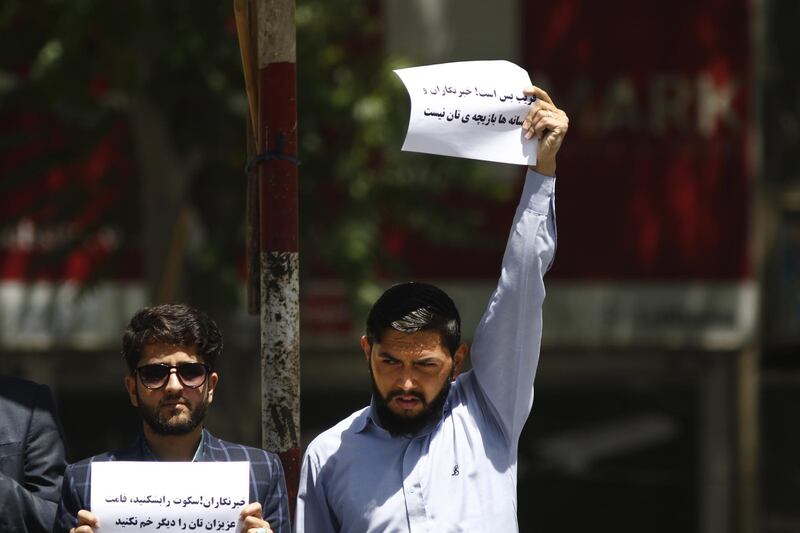Afghanistan's slain journalists were remembered on World Press Freedom Day Thursday, days after the deadliest attack on the country's media since the fall of the Taliban in 2001.
Ten journalists, including Agence France-Presse chief photographer Shah Marai, were killed in assaults on Monday, underscoring the dangers faced by the media as the war-torn country slips deeper into violence.
"Afghanistan's journalists are among the bravest in the world", said Omar Waraich, Amnesty International's deputy director for South Asia.
"Working in some of the most difficult conditions, they have faced threats, intimidation and violence for simply doing their jobs".
A double suicide blast in Kabul on Monday, claimed by the Islamic State group, left 25 people dead including Marai and eight other journalists, while a BBC reporter was killed in a separate attack in eastern Khost province.
Media workers from Tolo News, 1TV, Radio Free Europe and Mashal TV were also among the dead in Kabul.
The deadly assaults have shaken Afghanistan's tight-knit journalist community. Most of them are close friends as well as colleagues who look out for one another as they work in an increasingly hostile environment.
But they remain defiant, with dozens of Afghan news editors and executives returning to the site of the Kabul blast hours later Monday in protest.
"World Press Freedom Day reminds me and my colleagues of the importance of reporting - reporting for a vibrant democracy", Parwiz Kawa, editor-in-chief of the Hasht-e-Subh Daily newspaper, told AFP.
1TV editor-in-chief Abdullah Khenjani said Thursday was a "mourning day" for the broadcaster, which lost a reporter and cameraman in Monday's blast.
He told AFP his colleagues were heartbroken, "especially when we see the empty chairs... in our newsroom".
"Afghan journalists who work in an increasingly hostile environment deserve more support and protection", said Lotfullah Najafizada, director of Tolo News.
Afghanistan was last year ranked the third most dangerous country in the world for journalists by Reporters Without Borders (RSF).
Afghan media outlets have condemned the government's failure to protect them, particularly at the scene of suicide attacks where secondary blasts are a constant concern.
________________
Read more:
ISIS killed 10 of my colleagues today: Afghanistan reporter recounts bombing in Kabul
Taliban suicide bomber kills six in Helmand as spring offensive begins
Afghanistan launches leaflet drop to boost lacklustre voter registration
________________
The British embassy in Kabul also released a statement Thursday vowing to stand behind Afghan journalists, with the UK's minister for Asia and the Pacific Mark Field saying their bravery "has been noted the world over".
"Despite the risks, they stand firm together, determined never to be cowed by terrorists", he said in the statement.
The attack on the Afghan journalists comes amid increasing concerns over press freedom across Asia, including in the Philippines, Myanmar and Pakistan.
On the same day as the Afghan journalists were killed, Philippine radio broadcaster Edmund Sestoso was shot by assailants in the southern city of Dumaguete, said Human Rights Watch. Sestoso died Tuesday.
"That he died on the eve of World Press Freedom Day serves as a reminder that much needs to be done for press freedom around the world and end the slaughter of journalists", said HRW researcher Carlos Conde.
A collaborative of press advocates said in a report that attacks against journalists in the Philippines have spiked since Rodrigo Duterte won the presidency in May 2016, citing 85 cases - including murder.
In Myanmar, hopes have been dashed of more press freedom under the government of Aung San Suu Kyi, which took power in 2016.
The country has fallen six places to 137th on the 2018 World Press Freedom Index. A recent survey of journalists cited an increase in threats, physical attacks and arrests of reporters.
Two Reuters journalists, who were investigating the extrajudicial killing of Rohingya Muslims, face charges that could result in 14-year jail sentences if convicted.
Journalists in Pakistan, where fears of a crackdown are also growing, marked the day with a march in the capital Islamabad, carrying photos of fallen comrades – including those from Afghanistan – with slogans such as "Killed but not silenced".
Pakistan is already routinely ranked as one of the most dangerous places for media, with journalists caught between militants and the military. Enforced disappearances are on the rise, newspaper columns are being pulled and TV channels forced off the air for failing to toe the line.
A new report from the Freedom Network watchdog recorded more than 150 attacks and violations against the media in the past year. "It's very harsh," said Abid Khurshid, president of the Kashmir Journalists Forum.





